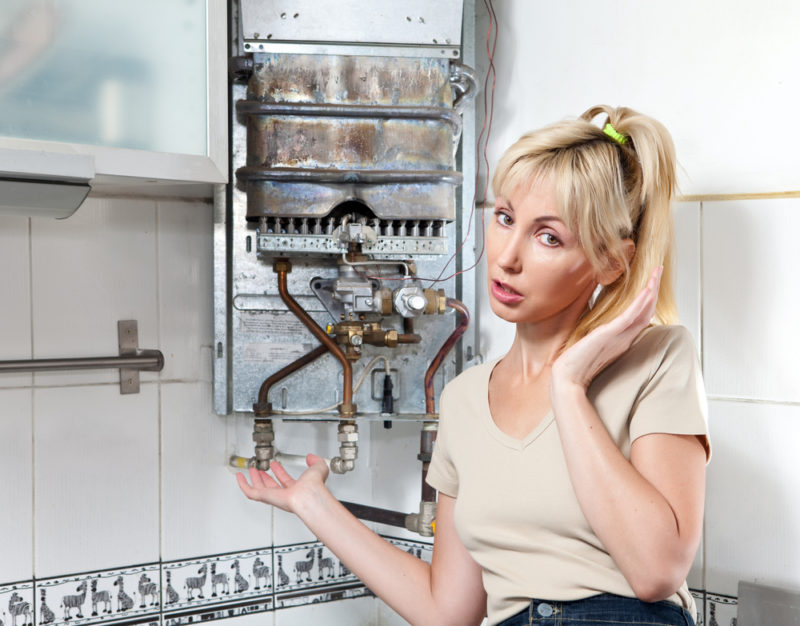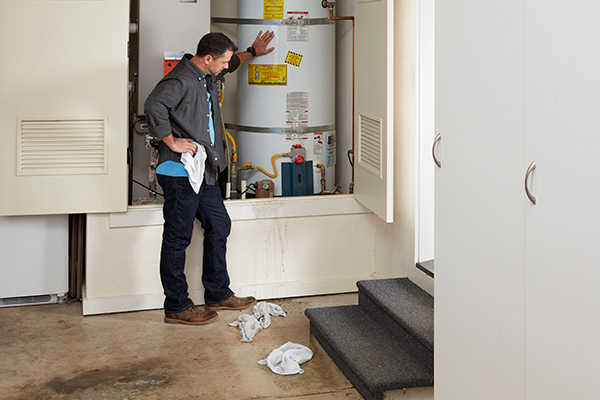This great article which follows involving Maintaining & Draining a Water Heater is immensely entertaining. Give it a try and make your own assumptions.

Whether it is located in the cellar or a different space, damaged water heaters can trigger tension. A conventional system holds 80 gallons, so an overnight leak will certainly cause a flood. This causes major home damage with soaked wall surfaces as well as floors. Besides, having no warm water supply is also bothersome. If you are handling these concerns, keep in mind of the following:
Shut Off Power Source
Prior to calling the plumber, turned off a gas hot water heater by transforming the temperature dial. This is generally found on top of the thermostat. If you have a design that works on electric power, turn off the breaker. This will certainly prevent electrocution, specifically if there is a leak as water is a conductor. Commonly, the burner shuts off when the water hits a particular temperature. With a damaged storage tank, it may malfunction. Cutting it off assures you remain secure.
Cut Off the Cold Water Supply
Cut off the containers faucet water supply from the resource. This goes from your main water line into the tank. When your storage tank is in good condition, the cold water quits filling up when the container is full. Yet considering that it is leaking, the water will certainly remain to stream. Shut the valve discovered on top of the heating unit. Turn this clockwise to close it off. You need to transform off that major water supply line outside your residential or commercial property if you can not discover it or reach it.
Call the Plumber
After doing the initial two safety and security steps, you need to call your plumber to come right away to deal with a ruptured water heating system. There are usually indicators that your aging water heating system has sediment buildup in the inside.
Do not await major flooding to call the plumber. By then, you will have to spend more to restore your residential or commercial property. Instead, as soon as you find these indications, have an expert concerned examine your water heater thank. Usually, water heaters have a lifespan of concerning 8 to 12 years. With normal assessment and maintenance, you can prolong its life.
Tidy up Home
After calling the plumber, file damages by remembering and also photos so you can assert your property owner's insurance policy. From there, start the instant cleaning. Take out any kind of vital possessions to avoid more soaking. Then, eliminate any type of standing water to stop mold and mildew and mildew development. Make use of that to drain pipes the water if you have a submersible water pump. Otherwise, the conventional bucket technique will certainly additionally function. Try to wipe out everything, consisting of walls and wall surfaces. If you have an electric fan and dehumidifier, keep them going to keep air flowing. This will assist hinder mold and mildew development.
Bear in mind, if you see any issues with your water heating unit, call the pros right away. You can not take this trouble gently due to the fact that a damaged thermostat can raise water temperature to a precariously high level, leading to unexpected burns.
Whether it is situated in the cellar or a separate space, damaged water heating systems can trigger tension. Before calling the plumber, shut off a gas water heating unit by transforming the temperature dial. After doing the very first 2 security steps, you must call your plumber to come right away to take care of a ruptured water heating unit. If you have a completely submersible water pump, make use of that to drain pipes the water. Bear in mind, if you notice any issues with your water heating system, call the pros right away.
Is My Water Heater Broken?
The Water Heater is Old
No appliance will last forever. This includes a home’s water heater. During its lifespan, residents are going to face a situation where a new water heater installation will be necessary. The biggest problem with this is that most people are not sure when their water heater expires. Not knowing this can lead to serious risks if the unit begins to act up due to old age.
Most makes and models of water heaters will last between eight and 10 years. While 10 years is the age when water heater replacement is highly recommended, the need to replace the unit may occur before this time or after. If the unit doesn’t show any symptoms of a problem, it is a good idea to replace it at the 10-year mark (from the manufacture date).
Some of the symptoms that indicate a new unit is needed include rusting, leaks, noises, and a failure to heat up the water. Also, note that not all units have a 10-year life expectancy. The main exception to this rule is that a gas unit will last for six to eight years.
Rusty Heater Inlet Valve or Water
While steel is the strongest material on earth, it does have a weakness – rust. If corrosion occurs on a steel surface, it will begin to spread and eat through the steel in certain areas. On water tanks and pipes that are made of steel, rust is a warning sign of an impending leak.
The issue for many is trying to figure out if the rust is coming from the water heater or the pipes that lead to the faucet. If rust is seen, it is a clear indication that water heater service from the professionals is needed.
If rusty water appears out of the faucets in the bathtub or sink, it likely means a rusty water heater. If there is rust near the water inlet or the pressure relief valve, rust has likely developed inside the tank. If tap water appears rusty, it may be an issue with the pipes.
Strange Sounds from the Water Heater
Are there strange sounds coming from the tank? As a water heater gets older, rumbling noises may develop and get louder and louder as the water in the tank heats up. In homes where large amounts of hot water are used, the issue is likely going to be even more obvious when more serious issues arise. If there is a strange or loud noise coming from the unit, it is probably because of sediment buildup. A good way to remedy this problem is by flushing the heater. If this does not work, then a new unit may need to be installed.
Leaks
As a water heater gets closer to the end of its useful life, there is a higher chance there will be water around the tank. If there is water, this usually means leaks are occurring. Based on where the unit is located in the home, a leak may result in serious property damage.
Leaks are usually caused by expansions in the metal tank. The expansions occur as time passes and as the inside body of the tank is exposed to multiple heating cycles per day. When a fracture forms, the gap will be slight enough to hold the water in; however, in more serious situations, this will not be the case. If the tank is idle, the water will not leak but when the metal expands during each heating system, small amounts of water will get through the gap.

Do you like reading up on Maintaining & Draining a Water Heater? Put a remark down below. We would be pleased to find out your views about this blog post. We hope that you come back again in the future. Liked our piece? Please share it. Help somebody else find it. Thanks so much for your time spent reading it.
Trusted for emergency plumbing excellence.